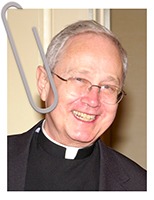Over four million people follow in the steps of Saints Vincent and Louise. The Vincentian family today is large, multicultural, multilingual, and prophetic with more than 150 branches all over the world.
The Vincentian Charism as an ecosystem
The Vincentian charism is wider than any one group. The Vincentian Family is actually an ecosystem. Our mission and purpose as a spiritual family is preaching the Gospel in the world of the impoverished.
I never thought of a “culture of vocations” in terms of an ecosystem. But St. Paul did long before the words “ecology” and “ecosystems” entered our vocabularies. Recall his concept of the “body of Christ. Each part is interconnected and at the service of each other. All parts of the system have contributions for the good of the whole.
Father Tomaž Mavrič, CM, President of the Executive Committee of the Vincentian Family and 24th successor of St. Vincent de Paul, wrote to the Vincentian Family::
In my letter of 25 January 2017, at the beginning of the 400th Anniversary of the Vincentian Charism, I invited every member of the Vincentian Family to take one very concrete step; that is, every member is to bring one new candidate to one of the branches of the Vincentian Family..
We are being asked to be vocation directors for the Vincentian charism, not just our own group. We are being asked to encourage people to explore whatever forms of the charism might be more suited to them.
Vocational awareness – engaging people in our charism
It seems to me Fr. Mavrič calls for a wide-angle vision of vocation. He asks us to look at the ecosystem of the Vincentian Charism manifested across the Vincentian Family.
I read it as a call for every member of every branch to invite people to consider engaging in the charism to “bring Good News to those who are poor.” Maybe we have put too much focus on our own particular group and missed encouraging individuals to see how their vocation may be better suited to another group in our ecosystem.
I don’t think Sr. Rosalie Rendu thought of herself as a Vocation Director for the Daughters. What Sr. Rosalie did so simply and humbly was to invite people to walk alongside as she ministered for more than 50 years in one neighborhood. She engaged people in actually bringing Good News. Thanks to her we have a whole new branch of the Family, the Society of St. Vincent de Paul which today numbers in the hundreds of thousands.
Fr. Mavrič expands his thoughts:
We carry in our hearts a deep desire to pass on to future generations the charism and spirituality we have been given. Prayers for new vocations are brought incessantly before God, along with so many initiatives and efforts.
The beginning of the fifth century of the Vincentian Charism gives us another opportunity to make renewed efforts toward a Culture of Vocations.
The Culture of Vocations means an environment in which all people can discover and rediscover their reason for being on this earth, the meaning of life, the mission they are called to fulfill, the call they are invited to answer. The Culture of Vocations puts Jesus in first place, no matter if it is as a layperson or a consecrated person.
Your brother in Saint Vincent,
Tomaž Mavrič, CM
Click below for an audio version of this Vincentian Mindwalk


I forgot to draw attention to an historic first attempt to explore what might be involved in a collaborative approach to vocations…
https://famvin.org/en/2018/12/31/meeting-of-the-vincentian-family-culture-of-vocations-task-force/
The Task Force outlined a 5 year proposal to foster the growth of the Family through:
collaboration to grow,
communication to revitalize,
and engagement to build.
I was taken aback a little by the reference to Sr Rosalie Rendu being responsible for the St Vincent de Paul Society. But then, the topic was “vocation.” She certainly helped put flesh on the bones of the vocations that would eventually evolve out of the St Vincent de Paul Society. Though not a founder, per se, she was certainly a tremendous influence on the How, What, Where and with Whom aspects of being Vincentian. The Why was evolving on its own, but she nudged that along too.
larry, Thanks for your clarification. I was actually trying to say what you rightly pointed out.
By living her vocation she attracted others to the charism of St. Vincent and St. Louise.
Among those she influenced by her example, was the group of young students.
I am sure she never dreamed that those she inspired by her life would establish what we know today as the Society.
However, it was her life that led these young men to discover their own style of following Christ the Evangelizer of the poor.
In this sense, she was a vocation director for the charism.